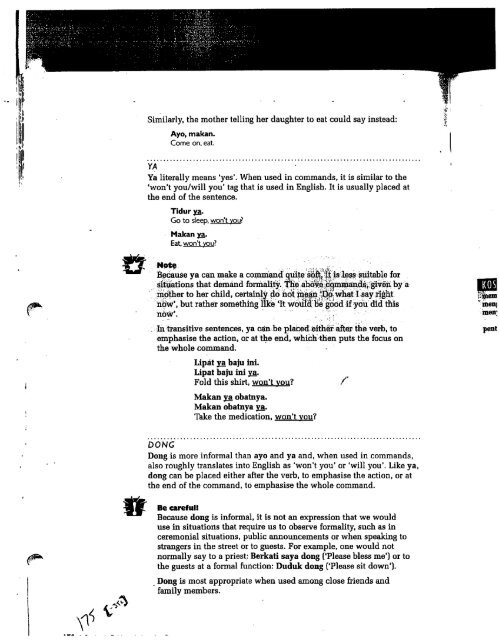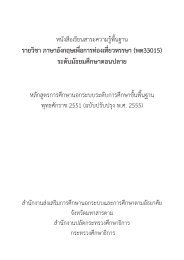bahasa indonesia
djenar-2003-a-students-guide-to-indonesian-grammar-oxford
djenar-2003-a-students-guide-to-indonesian-grammar-oxford
- No tags were found...
You also want an ePaper? Increase the reach of your titles
YUMPU automatically turns print PDFs into web optimized ePapers that Google loves.
lit<br />
pi:<br />
I.:<br />
similarly, the mother telling her daughter to eat could say instead:<br />
Ayo, makan.<br />
Come on, eat.<br />
Ya literally means 'yes'. When used in commands, it is similar to the<br />
'won't you/will you' tag that is used in English. It is usually placed at<br />
the end of the sentence.<br />
Tidur m.<br />
Go to sleep, won't you?<br />
Makan m.<br />
Eat, won't YOU?<br />
ri-<br />
.9<br />
-t<br />
C<br />
'<br />
. -': ,>,y..<br />
F~t!.il.<br />
Because ya can make a codqnd ;a we SOB %W is.lesq-suitable far<br />
sit&itions that demand formalitJ;. . %p abiijj4,:8:.8ynyuc@$,:giGii:n by a<br />
mother to her child, certainly do hdt jiyjp: .Do, :, what I. say riglit<br />
nbw', but rather something - 1ike"lt WOU~ be good if you did this<br />
7<br />
. .,.<br />
nbM.<br />
h transitive sentences, ya ctln .be pliied :tdthS after the verb, to<br />
emphasise the action, or at t&e end, which'-then puts the focus on<br />
the whole command.<br />
Lipat baju ini.<br />
Lipat baju ini m.<br />
Fold this shirt, won't you?<br />
Makan obatnya.<br />
Makan obatnya E.<br />
Take the medication, won't vou?<br />
....................................................................................<br />
DONG<br />
Dong is more informal than ayo and ya and, when used in commands,<br />
also roughly translates into English as 'won't you' or 'will you', Like ya,<br />
dong can be placed either after the verb, to emphasise the action, or at<br />
the end of the command, to emphasise the whole command.<br />
P<br />
pent<br />
I<br />
Be careful!<br />
Because dong is informal, it is not an expression that we would<br />
use in situatio~is that require us to observe formality, such as in<br />
ceremonial situations, public announcements or when speaking to<br />
strangers in the street or to guests. For example, one would not<br />
normally say to a priest.: Berkati saya dong ['Please bless me') or to<br />
the guests at a formal function: Duduk dong ('Please sit down'].<br />
Dong is most appropriate when used among close friends and



